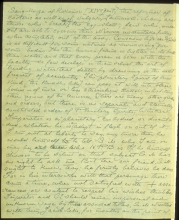Page 12
Sang-Ko-Pa of Kokonor (XIV Century), the reformer of esoteric as well as of vulgar Lamaism. Many are those who "break through the egg-shell," few who, once out are able to exercise their Nirvva namastaka fully, when completely out of the body. Conscious life in Spirit is as difficult for some natures as swimming is for some bodies. Though the human frame is lighter in its bulk than water, and that every person is born with the faculty, so few develop in themselves the art of treading water that death by drowning is the most frequent of accidents. The planetary Spirit of that kind (the Buddha like) can pass at will into other bodies — of more or less etherialised matter, inhabiting other regions of the Universe. There are many other grades and orders, but there is no separate and eternally constituted order of Planetary Spirits. Whether Imperator is a "planetary" embodied or disembodied, whether he is an adept in flesh or out of it, I am not at liberty to say, any more than he would himself to tell S.M. who I am, or may be, or even who H.P.B. is. If he himself chooses to be silent on that subject S.M. has no right to ask me. But then our friend, S.M. ought to know. Nay: he firmly believes he does. For in his intercourse with that personage there came a time when not satisfied with + assurances, or content to respect his wishes that he, Imperator & Co. should remain impersonal and unknown save by their assumed titles, S.M. wrestled with him, Jacob-like, for months on the point of



Sang-Ko-Pa refers to Tsongkhapa, the famous teacher of Tibetan Buddhism.
"Break through the egg-shell" is a quotation from The New American Cyclopaedia, vol. 4, 1869 and 1870, p. 66.
Nirvva namastaka (wrongly transcribed as nirira namastaka in the printed editions) is a misspelling of the term nirvāṇa-mastaka, which can be translated as "liberation."